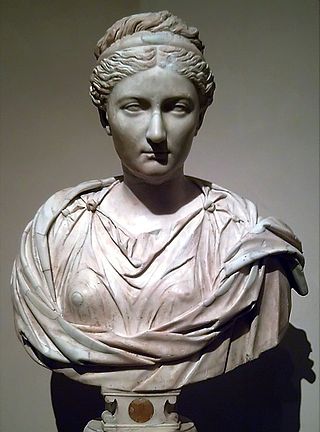Gaius Betitius Pius (c. 175 - after 223) was a Patronus of Canusium in 223.
He was the son of Gaius Betitius Maximillianus (born c. 145), Suffect Consul.
He married Seia Fuscinilla (born c. 185), sister of Seius Sallustius, Roman usurper Emperor, daughter of Seius (born c. 155) and wife Herennia Orbiana (born c. 160), and paternal granddaughter of Publius Seius Fuscianus (c. 120 - after 189), Consul in 151?, PUR 187-189 and Suffect Consul in 188, and had:

Salonia Matidia was the daughter and only child of Ulpia Marciana and wealthy praetor Gaius Salonius Matidius Patruinus. Her maternal uncle was the Roman emperor Trajan. Trajan had no children and treated her like his daughter. Her father died in 78 and Matidia went with her mother to live with Trajan and his wife, Pompeia Plotina.

Aurelia was the mother of the Roman general and statesman Julius Caesar.

Gaius or Lucius Fulvius Plautianus was a member of the Roman gens Fulvia. As head of the Praetorian Guard, he was very influential in the administration of state affairs, and clashed with Julia Domna, the wife of Septimius Severus.
Marcus Annius Verus was the paternal grandfather and adoptive father of the Roman Emperor Marcus Aurelius, and father-in-law of emperor Antoninus Pius.

Annia Cornificia Faustina was the youngest child and only daughter of the praetor Marcus Annius Verus and Domitia Lucilla. The parents of Cornificia came from wealthy senatorial families who were of consular rank. Her brother was the future Roman emperor Marcus Aurelius, and both were born and raised in Rome.
Marcus Annius Libo was a Roman Senator active in the early second century AD.
Gaius Julius Bassus was a Roman senator. He was quaestor, and later governor of Bithynia and Pontus for the term 100/101; two inhabitants of that public province indicted him in the Senate for corruption, and Pliny the Younger successfully defended him from these charges.
Marcus Caeionius Silvanus was a Roman senator of the second century AD.
Gaius Asinius Frugi, was a Roman moneyer who was officially permitted to mint money for use in Phrygia between 98 and 116. He was probably a descendant of Nicomachus, a notable of Lydia in 1 BC.
Quintus Fabius Clodius Agrippianus Celsinus was proconsul of Caria in 249. He was the son of Clodius Celsinus and his wife Fabia Fuscinella, paternal grandson of Marcus Clodius Macrinus Hermogenianus, and great-grandson of Marcus Clodius Macrinius Vindex Hermogenianus, a proconsul of Africa c. 200. His wife was Laberia Pompeiana. His maternal grandparents were Quintus Fabius and wife Fuscinella, daughter of Publius Seius Fuscianus, consul in 151, praefectus urbi from 187 to 189 and suffect consul in 188.
Betitius Perpetuus Arzygius was a Corrector Provinciae of Sicilia in 312/314.
Libo Rupilius Frugi was a Roman senator and an ancestor of the emperor Marcus Aurelius. He served as suffect consul in 88.
Lucius Aelius Lamia Plautius Aelianus was a Roman senator.
Gaius Avidius Nigrinus was a Roman senator who lived between the 1st and 2nd centuries. Nigrinus served as suffect consul for the nundinium of April to June 110 with Tiberius Julius Aquila Polemaeanus as his colleague.

Vibia Aurelia Sabina was the youngest daughter and child born to Roman Emperor Marcus Aurelius and Roman Empress Faustina the Younger. She was a sister to Roman Empress Lucilla and Roman Emperor Commodus. Her maternal grandparents were Roman Emperor Antoninus Pius and Roman Empress Faustina the Elder and her paternal grandparents were Domitia Lucilla and praetor Marcus Annius Verus.
Pomponia Ummidia was an Anatolian Roman noblewoman and was a prominent figure in Rome during the reigns of the Roman Emperors Gallienus, Claudius Gothicus, Quintillus and Aurelian. She lived in the period the Crisis of the Third Century in the Roman Empire.
Sulpicia Praetextata was an ancient Roman noblewoman who lived in the Roman Empire in the 1st century.
Gaius Aufidius Victorinus was a Roman senator and general of the second century. A friend of the Emperor Marcus Aurelius and the son-in-law of the advocate and orator Marcus Cornelius Fronto, he was twice consul and governor of several Roman provinces.

The gens Plautia, sometimes written Plotia, was a plebeian family at ancient Rome. Members of this gens first appear in history in the middle of the fourth century BC, when Gaius Plautius Proculus obtained the consulship soon after that magistracy was opened to the plebeian order by the Licinio-Sextian rogations. Little is heard of the Plautii from the period of the Samnite Wars down to the late second century BC, but from then to imperial times they regularly held the consulship and other offices of importance. In the first century AD, the emperor Claudius, whose first wife was a member of this family, granted patrician status to one branch of the Plautii.
Gaius Ummidius Quadratus Sertorius Severus was a Roman senator active during the second century AD. He was suffect consul in absentia for the nundinium of May to June 118 as the colleague of the emperor Hadrian. He is more frequently known by his shorter name, Gaius Ummidius Quadratus; his full name was known only after a missing piece to an inscription from Tomis was found.